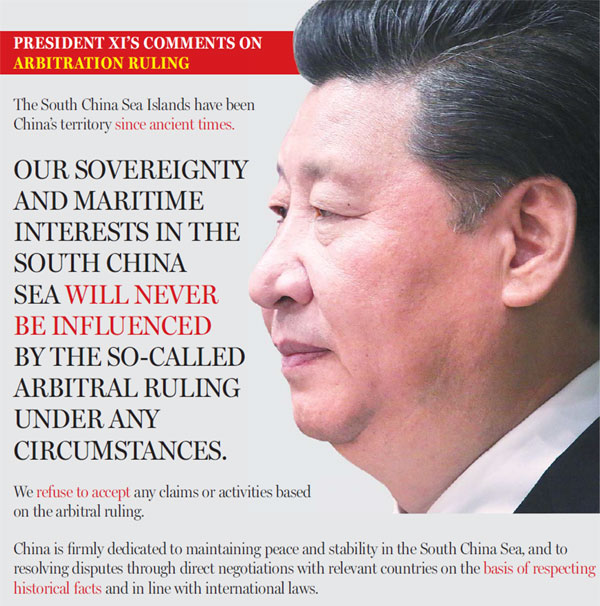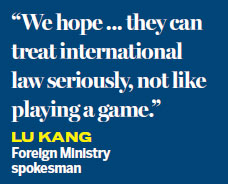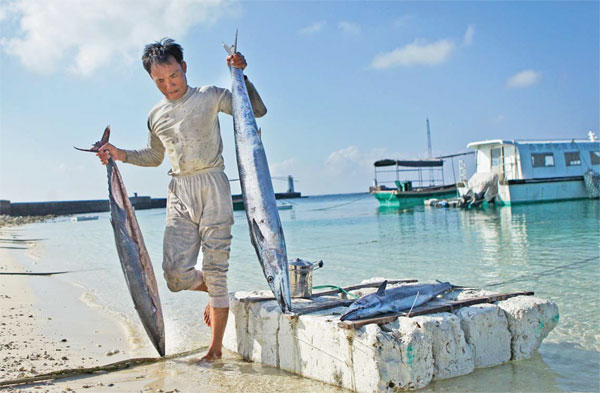Null & void
Updated: 2016-07-15 08:05
By An Baijie and Fu Jing(China Daily Europe)
|
|||||||||
Nation may act if it is threatened, official says
China would not rule out the option of setting up an air defense identification zone over the South China Sea if it felt threatened, according to a senior Chinese diplomat.
Liu Zhenmin, vice-minister of foreign affairs, said on July 13 that such a move, which would require aircraft entering the ADIZ to identify themselves to the Chinese military, would depend on "the level of threat received".

Speaking amid rising maritime tensions caused by the Philippines' arbitration case, he said, "If our security is being threatened, of course we have the right to demarcate a zone."
He added that other countries should not "take this opportunity to threaten China" or "let it become the origin of a war". China's aim is to "turn the South China Sea into a sea of peace, friendship and cooperation", he said.
The arbitral tribunal, appointed by the Permanent Court of Arbitration in The Hague, said on July 12 that China has no "historic title" over the South China Sea.
Shortly after the announcement, President Xi Jinping reiterated that China is committed to resolving disputes through direct negotiations, but said its national sovereignty and maritime interests will not be influenced under any circumstances by The Hague ruling.
"The South China Sea Islands have been China's territory since ancient times," he said during a meeting in Beijing with European Council President Donald Tusk and European Commission President Jean-Claude Juncker. "We refuse to accept any claims or activities based on the arbitral ruling."
China has always respected international laws and justice and kept to a path of peaceful development, Xi said, adding that maritime disputes should be resolved though direct negotiations on the basis of respecting historical facts and in line with international law.
Beijing issued two statements immediately after the ruling at The Hague. Noting that Chinese activities in the South China Sea date back more than 2,000 years, one statement pointed out that China is the first to have discovered, named, explored and exploited the sea's islands and surrounding waters.
The State Council Information Office also released a five-chapter white paper on the disputes between China and the Philippines in the South China Sea.
The core of the disputes, the white paper says, are territorial issues caused by the Philippines' invasion and illegal occupation of Nansha islands and reefs.
Liu has accused the five judges of the arbitral tribunal of "making money from the Philippines" and said "maybe other people gave them money, too".

He said Shunji Yanai, a former Japanese president of the International Tribunal for the Law of the Sea, has "manipulated the entire proceedings" from behind the scenes and questioned whether the judges - four Europeans and a Ghanaian chairman, a longtime resident of Europe - could understand the complex geographic politics of Asia.
The diplomat said China hopes the new Philippine government, led by President Rodrigo Duterte, will not use the arbitration results and added that China is willing to negotiate with its South China Sea neighbors on jointly exploiting oil and gas resources.
China has also urged the United States and Japan "to stop distorting international law" and using the arbitration on the South China Sea to serve their political aims.
Cui Tiankai, the Chinese ambassador in Washington, said on July 12 that territorial issues in the sea should not become issues between China and the US. "We will not yield to any pressure, be it in the form of military activities, media criticism or some self-claimed legal bodies," he said at the Center for Strategic and International Studies.
Foreign Ministry spokesman Lu Kang said at a media briefing on July 13, "We hope ... they (the US, Japan and other countries pressing China to accept The Hague ruling) can treat international law seriously, not like playing a game, and not to distort and selectively abuse international law to serve their hidden political aims."
He said Japan should be clear about the history of the South China Sea issue because the Chinese islands were taken by Japan during World War II and were returned to China after Japan's surrender. He urged Japan to respect the postwar international order and stop interfering in the issue.
Some experts have accused the US of stirring matters in the sea to block China and improve its regional military and diplomatic presence, and of using former Philippine president Benigno Aquino was used as a pawn to aid its Asia-Pacific strategy.
Tao Wenzhao, a researcher of US studies at the Chinese Academy of Social Sciences, says the arbitration was not solely the business of the Philippines.
"We can see Washington, which never ratified the United Nations Convention on the Law of the Sea, encouraged and supported Manila to initiate the arbitration case from the very beginning," Tao says, adding that the top lawyers Manila hired were US citizens.
Call to open talks
In fact, the US set the precedent of nonparticipation and nonacceptance of a ruling by a third party to settle an international dispute in the Nicaragua case of the 1980s.
Recently, seven US warships have been patrolling the South China Sea, including the aircraft carrier Ronald Reagan and three destroyers, which have sailed close to Chinese reefs and islands.
Oskar Krejci, director of the Institute of Global Studies at the University of Jan Amos Komensky Prague, says the US is not acting in the region like someone trying to restore balance. Instead, it acts like a purveyor of "a military presence strategy, and therefore is making an effort to maintain US hegemony in the region".
Former senior government officials in the Philippines have called on the Duterte administration to start talks with China and to ignore the ruling.
"The negotiations must start immediately. The arbitral ruling is both useless and irrelevant," says Butch Valdes, former undersecretary of the Philippine Education Department.
Valdes questioned the validity of the ruling, which claims Taiping Island as a rock despite the fact the island has an airstrip, a hospital, several buildings and fresh water. "There is something wrong with the so-called arbitration court," he says.
Alberto Encomienda, former secretary-general of the Maritime and Ocean Affairs Center of the Philippine Foreign Affairs Department, says his country should not have taken the case to the tribunal in the first place. He agrees with Valdes that the two governments should talk to solve the disputes as soon as possible.
Meanwhile, Taiwan said on July 12 that it does not accept the tribunal's ruling. The decision on Taiping Island, part of the Nansha Islands group, has "seriously impaired" its rights, according to the office of Taiwan leader Tsai Ing-wen.
According to China's Foreign Ministry, more than 70 countries have expressed support for China's stance that negotiation and not arbitration is the only way to resolve South China Sea disputes.
Peter van Tuijl, executive director of the Secretariat of the Global Partnership for the Prevention of Armed Conflict Foundation, which is based in The Hague, says all parties now should talk to set up a mechanism to prevent further escalation of conflicts and tensions.
"This is what China, the Philippines, the US and other parties should do to refrain from using military force," he says. "Of course, the international community should be very clear that China will not accept this ruling, as it has already stated many times."
Nirj Deva, vice-chairman of the European Parliament's development committee, told Xinhua News Agency that the arbitration had solved nothing. "It's a matter of territorial dispute. This issue should not have gone to The Hague."
He says Aquino made the "wrong decision" and broke his country's commitment made in the 2002 Declaration on the Conduct of Parties in the South China Sea.
According to the declaration, China and members of the Association of Southeast Asian Nations agreed to settle regional disputes through consultation and negotiation. However, by not consulting China about involving a third party, the Philippines walked away from its commitment, Deva says.
By contrast, he praised China for abiding by its international commitments. "On the whole, if you look at China's history, it has been a very good obeyer of international laws and has kept to all international treaties that it has signed."
Many African countries have voiced their support of China's stance.
"China has shown a lot of restraint (and) steadily maintained the need for dialogue with its neighbors, a sign of great diplomacy and respect to other states despite its growing global influence," says Albert Yankey, the Ghanaian ambassador to Ethiopia. "It's critical that a solution be forged peacefully."
Warren Gunda, director of political affairs for the Malawi Foreign Ministry, adds that the parties involved should sit down to resolve the dispute.
"Communities sharing borders have lived together for generations in peaceful coexistence, and resolutions made without any regard to this relationship will open irreparable divisions," he says. "Obviously there is documentation and history to be considered during the discussions. But dialogue is important."
Contact the writers through anbaijie@chinadaily.com.cn
Chen Yingqun and Pan Zhongming contributed to this story.
|
A fisherman transports his catch after a day's work off Yongxing Island in Sansha, Hainan province, in late 2012. Sansha, China's southernmost city, was established in June 2012. Zheng Huansong / Xinhua |
(China Daily European Weekly 07/15/2016 page1)
Today's Top News
Live: Truck attack kills over 80 in Nice
Chinese FM extends condolences to attack victims
Li slams attack in France, expresses condolence
May stuns political world by appointing Boris Johnson
Li calls Sino-Mongolia ties 'best ever'
Russian, Chinese officials discuss space cooperation
25 killed, 50 injured as trains collide in Italy
EU called on to fulfill WTO promises
Hot Topics
Lunar probe , China growth forecasts, Emission rules get tougher, China seen through 'colored lens', International board,
Editor's Picks

|

|

|

|

|

|








